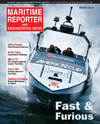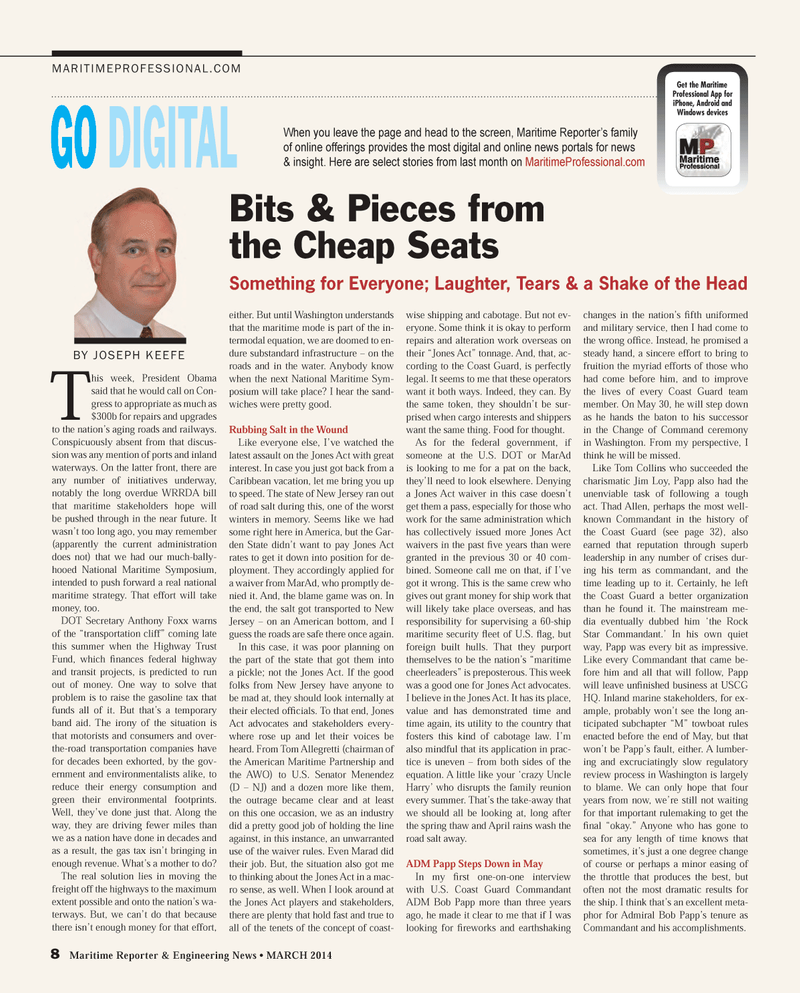
Page 8: of Maritime Reporter Magazine (March 2014)
U.S. Coast Guard Annual
Read this page in Pdf, Flash or Html5 edition of March 2014 Maritime Reporter Magazine
T his week, President Obama said that he would call on Con- gress to appropriate as much as $300b for repairs and upgrades to the nation’s aging roads and railways.
Conspicuously absent from that discus- sion was any mention of ports and inland waterways. On the latter front, there are any number of initiatives underway, notably the long overdue WRRDA bill that maritime stakeholders hope will be pushed through in the near future. It wasn’t too long ago, you may remember (apparently the current administration does not) that we had our much-bally- hooed National Maritime Symposium, intended to push forward a real national maritime strategy. That effort will take money, too.
DOT Secretary Anthony Foxx warns of the “transportation cliff” coming late this summer when the Highway Trust
Fund, which fi nances federal highway and transit projects, is predicted to run out of money. One way to solve that problem is to raise the gasoline tax that funds all of it. But that’s a temporary band aid. The irony of the situation is that motorists and consumers and over- the-road transportation companies have for decades been exhorted, by the gov- ernment and environmentalists alike, to reduce their energy consumption and green their environmental footprints.
Well, they’ve done just that. Along the way, they are driving fewer miles than we as a nation have done in decades and as a result, the gas tax isn’t bringing in enough revenue. What’s a mother to do?
The real solution lies in moving the freight off the highways to the maximum extent possible and onto the nation’s wa- terways. But, we can’t do that because there isn’t enough money for that effort, either. But until Washington understands that the maritime mode is part of the in- termodal equation, we are doomed to en- dure substandard infrastructure – on the roads and in the water. Anybody know when the next National Maritime Sym- posium will take place? I hear the sand- wiches were pretty good.
Rubbing Salt in the Wound
Like everyone else, I’ve watched the latest assault on the Jones Act with great interest. In case you just got back from a
Caribbean vacation, let me bring you up to speed. The state of New Jersey ran out of road salt during this, one of the worst winters in memory. Seems like we had some right here in America, but the Gar- den State didn’t want to pay Jones Act rates to get it down into position for de- ployment. They accordingly applied for a waiver from MarAd, who promptly de- nied it. And, the blame game was on. In the end, the salt got transported to New
Jersey – on an American bottom, and I guess the roads are safe there once again.
In this case, it was poor planning on the part of the state that got them into a pickle; not the Jones Act. If the good folks from New Jersey have anyone to be mad at, they should look internally at their elected offi cials. To that end, Jones
Act advocates and stakeholders every- where rose up and let their voices be heard. From Tom Allegretti (chairman of the American Maritime Partnership and the AWO) to U.S. Senator Menendez (D – NJ) and a dozen more like them, the outrage became clear and at least on this one occasion, we as an industry did a pretty good job of holding the line against, in this instance, an unwarranted use of the waiver rules. Even Marad did their job. But, the situation also got me to thinking about the Jones Act in a mac- ro sense, as well. When I look around at the Jones Act players and stakeholders, there are plenty that hold fast and true to all of the tenets of the concept of coast- wise shipping and cabotage. But not ev- eryone. Some think it is okay to perform repairs and alteration work overseas on their “Jones Act” tonnage. And, that, ac- cording to the Coast Guard, is perfectly legal. It seems to me that these operators want it both ways. Indeed, they can. By the same token, they shouldn’t be sur- prised when cargo interests and shippers want the same thing. Food for thought.
As for the federal government, if someone at the U.S. DOT or MarAd is looking to me for a pat on the back, they’ll need to look elsewhere. Denying a Jones Act waiver in this case doesn’t get them a pass, especially for those who work for the same administration which has collectively issued more Jones Act waivers in the past fi ve years than were granted in the previous 30 or 40 com- bined. Someone call me on that, if I’ve got it wrong. This is the same crew who gives out grant money for ship work that will likely take place overseas, and has responsibility for supervising a 60-ship maritime security fl eet of U.S. fl ag, but foreign built hulls. That they purport themselves to be the nation’s “maritime cheerleaders” is preposterous. This week was a good one for Jones Act advocates.
I believe in the Jones Act. It has its place, value and has demonstrated time and time again, its utility to the country that fosters this kind of cabotage law. I’m also mindful that its application in prac- tice is uneven – from both sides of the equation. A little like your ‘crazy Uncle
Harry’ who disrupts the family reunion every summer. That’s the take-away that we should all be looking at, long after the spring thaw and April rains wash the road salt away.
ADM Papp Steps Down in May
In my fi rst one-on-one interview with U.S. Coast Guard Commandant
ADM Bob Papp more than three years ago, he made it clear to me that if I was looking for fi reworks and earthshaking changes in the nation’s fi fth uniformed and military service, then I had come to the wrong offi ce. Instead, he promised a steady hand, a sincere effort to bring to fruition the myriad efforts of those who had come before him, and to improve the lives of every Coast Guard team member. On May 30, he will step down as he hands the baton to his successor in the Change of Command ceremony in Washington. From my perspective, I think he will be missed.
Like Tom Collins who succeeded the charismatic Jim Loy, Papp also had the unenviable task of following a tough act. Thad Allen, perhaps the most well- known Commandant in the history of the Coast Guard (see page 32), also earned that reputation through superb leadership in any number of crises dur- ing his term as commandant, and the time leading up to it. Certainly, he left the Coast Guard a better organization than he found it. The mainstream me- dia eventually dubbed him ‘the Rock
Star Commandant.’ In his own quiet way, Papp was every bit as impressive.
Like every Commandant that came be- fore him and all that will follow, Papp will leave unfi nished business at USCG
HQ. Inland marine stakeholders, for ex- ample, probably won’t see the long an- ticipated subchapter “M” towboat rules enacted before the end of May, but that won’t be Papp’s fault, either. A lumber- ing and excruciatingly slow regulatory review process in Washington is largely to blame. We can only hope that four years from now, we’re still not waiting for that important rulemaking to get the fi nal “okay.” Anyone who has gone to sea for any length of time knows that sometimes, it’s just a one degree change of course or perhaps a minor easing of the throttle that produces the best, but often not the most dramatic results for the ship. I think that’s an excellent meta- phor for Admiral Bob Papp’s tenure as
Commandant and his accomplishments. 8 Maritime Reporter & Engineering News • MARCH 2014
GO DIGITAL
Get the Maritime
Professional App for iPhone, Android and
Windows devices
MARITIMEPROFESSIONAL.COM
When you leave the page and head to the screen, Maritime Reporter’s family of online offerings provides the most digital and online news portals for news & insight. Here are select stories from last month on MaritimeProfessional.com
Bits & Pieces from the Cheap Seats
Something for Everyone; Laughter, Tears & a Shake of the Head
BY JOSEPH KEEFE
MR #3 (1-9).indd 8 3/4/2014 9:47:27 AM

 7
7

 9
9
